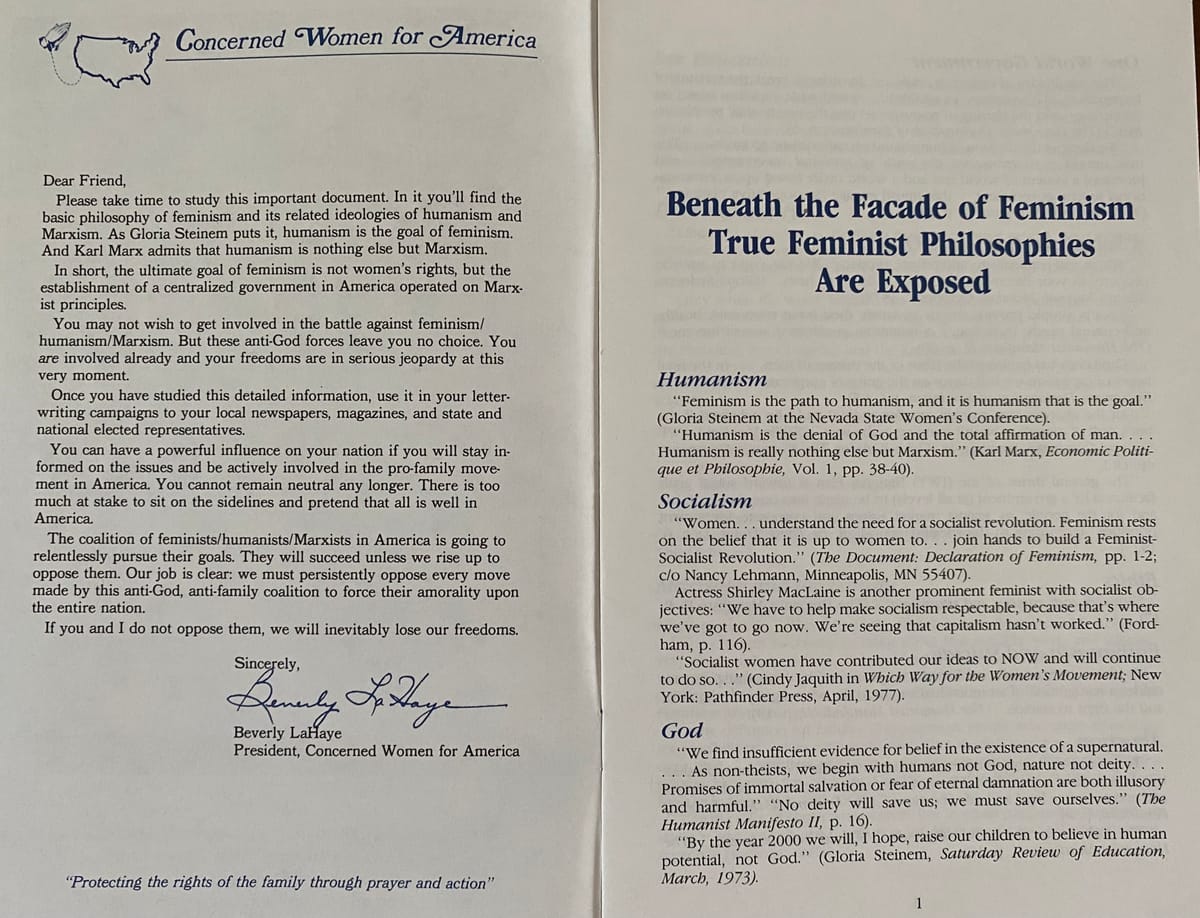The Vance Pick and the Fading Evangelical Woman
What's happening to evangelical women?

In 2016, Donald Trump chose Mike Pence as his running mate to assuage the lingering doubts of evangelical voters, who were thought to be comforted by having one of their own on the ticket. His pick of J.D. Vance this week shows a very different strategy. Trump is rewarding the rampant opportunism of the anti-democracy far right. He is also signaling that his eight years atop the GOP have altered the power centers of the conservative movement, and the role of the Christian right within it.
Amid these internally destabilizing changes, evangelical women are starting to lose their visibility.
Sixteen years ago, when John McCain tapped her as his running mate, Sarah Palin was the poster child for the evangelical woman rising in Republican politics. She cracked the Pentecostal ceiling, and helped bring the charismatic Christianity that later fueled Trump's evangelical support into the mainstream of Republican politics. Trump capitalized on the trail she blazed, and solidified his connection with a constituency that, like Palin, believes in spiritual warfare, signs, wonders, and miracles, including that God anointed Trump to save America.
Of course Trump, a notorious misogynist, was not likely to pick a woman in 2016 or now. Instead, he picked a guy who had just spoken to the far-right National Conservatism conference in Washington, DC, which was nearly completely dominated by men. Women were discussed as birthing vessels for a fecund Christian nation, but little else. As Sarah Jones reported for New York magazine, a main theme of the event was "an explicit obsession with white Christian fertility," which "animates the crowd perhaps more than any other subject."
In his remarks to the conference, Vance praised this autocratic festival as "the place of the intellectual leadership of the American conservative movement," and now its mainstream.
There is obviously cross-pollination between these Christian nationalist movements, and the Christian right, too, has promoted fertility, "biblical" womanhood, and wifely submission to husbands. But for decades, the Christian right also recognized that women are key to mobilizing the base to vote, lobby legislators, and even run for office—in other words, to be very present for political activism.
Early Christian right leaders like Phyllis Schlafly, who spearheaded the successful campaign to kill the Equal Rights Amendment, and Beverly LaHaye, who in 1979 founded Concerned Women for America and taught housewives "how to lobby from your kitchen table," purported to give right-wing women an empowering alternative to feminism, encouraging them to flex their ("biblically" feminine) muscles in the public square. But Trump's choice of Vance sends a strong signal of their irrelevancy to him.
Nikki Haley, Trump's former UN Ambassador and rival for the 2024 Republican nomination, also was once considered a rising star in the party, an enthusiastic convert to evangelical Christianity and fresh face of a supposedly diversifying, more moderate GOP. She's now been reduced to releasing her delegates to Trump and saying she'll vote for him, after calling him "unhinged" and "not qualified" to serve as president just a few months ago.
In Haley's home state of South Carolina, three female Republican lawmakers who dared to filibuster a near-total abortion ban in the state legislature lost to male primary challengers this year, making it likely the state legislature will have no Republican women in 2025. In Washington, Rep. Cathy McMorris Rodgers, an evangelical also once considered a rising star in Congress, is not running for reelection.
Now, the most visible evangelical woman in Congress is Marjorie Taylor Greene. She's a Christian nationalist and MAGA superstar who prioritizes shitposting over legislating, angering the top powerbrokers of the Christian right. In April, these leaders engaged in a highly visible rebuke of her threats to oust House Speaker Mike Johnson, himself an evangelical hero closely aligned with some of the movement's most influential figures. Appearing on the Christian Broadcasting Network and on a podcast hosted by Family Research Council president Tony Perkins on the Salem News Network, Johnson assailed Greene for boosting her own career at the expense of the interests of the party in defeating Democrats.
Vance, a convert to Catholicism, has spent his very short political career as a chameleon who pretends at being a hillbilly but whose resume includes a law degree from Yale and Silicon Valley billionaire backing for his venture capital firm. Now his latest iteration is playing an uber-manly, natalist nationalist bent on crushing democracy and the left. Since Trump's announcement yesterday, the Christian right has been praising his anti-abortion extremism (he has likened abortion to slavery, called it an "atrocity," opposed exceptions to abortion bans, and campaigned for Senate in 2022 on "ending" it entirely). Trump did not burn any bridges with his evangelical base, but he did not exactly pick someone who, like Pence, was a very well-known and trusted quantity within the movement.
What seems to have mattered most to Trump—or to his sons, who reportedly pushed their wavering father to choose Vance—is that Vance represents a rising, anti-democratic flank of the right that is eager to carry out a full-blown autocratic takeover of the federal government. But it is so dominated by men that the women of the Christian right, central to Trump's electoral support, seem to be vanishing into the background. Whether that matters in November remains to be seen, but it's hard to ignore that Trump is dialing up the misogyny to eleven.
